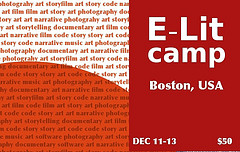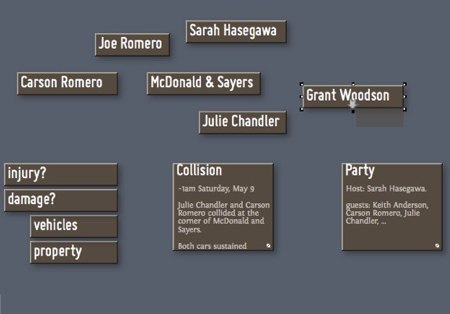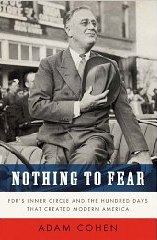Punchdrunk's Sleep No More is an astonishing production that does nearly everything I had imagined hyperdrama could achieve, and much that I had assumed it could not.
Get to Boston and see it. It runs through January 3. Cancel a class. Buy a plane ticket. Seriously.

Tori Sparks in Sleep No More, a Punchdrunk and A.R.T. presentation. Photo by Stephen Dobbie and Lindsay Nolin.
The play refracts Macbeth through Hitchock’s Rebecca. It is performed in a disused public school. There is no dialogue. The audience is free to wander everywhere. You wear a white mask, a spirit who can witness but cannot intervene. Some of the characters sometimes see ghosts.
At one point, a bunch of us spirits were watching a strange, agitated woman, The Second Mrs. DeWinter (Poornima Kirby), trying to comfort an agitated, alarmed Banquo (Jeffery Lyon) in a 1920’s dressing room cluttered with torn almanac pages and bric-a-brac. The scene ends. Banquo flees. The spirits file out the door.
As I am leaving, Mrs. DeWinter reaches out a hand to stop me. She closes the door. She locks it. She sits on the couch. She points to a small stool at her feet. I sit. Leaning close, she begins to tell me a whispered story about a dead girl who finds the moon made of rotten wood. She leans very close, her hand brushing the back of my neck.
And then, very slowly, she removes my mask.
This was extraordinary theater, an unforgettable penetration of the fourth wall. It is also extraordinarily difficult. It’s not improv: the story, it turns out, is scene 21 of Woyzeck. You’re acting across from a stranger. A different stranger every night. In a closed room. The rules are unclear, we’ve just started. It seems that anything can happen. And there’s no distance at all; the acting and the sets have to work from the back of the room and they have to work if you're standing right there, reading the slip of paper someone left on the dresser, feeling the actress stroke the back of our neck.
Nor is this, I think, a throwaway, a casual interpolation. There’s a lot going on in Sleep No More, but of course a lot of Macbeth is about the intersection of the world we know and the spirit world. In the bar after the performance, the third song just happens to pick up the story about the dead girl and the moon of rotten wood, a story Mrs. DeWinter told to a ghost:
Say it’s only a paper moon
Sailing over a cardboard sea
But it wouldn't be make-believe
If you believed in me .
There are wheels within wheels. The work is layered and detailed. After the show — the story repeats so you can see more — I thought I’d managed to witness most of the major scenes and to see most of the settings. But the American Repertory site has five publicity stills, and I saw none of those moments.
Hypertext skeptics often wring their hands about what people don’t see, about the work spent by the author on a path not taken. The experience works here, but it is going to be different for everyone. How many people get to see Mrs. DeWinter’s scene? Of those, how many are in the bar when the band strikes up Paper Moon ? How many get the Woyzeck allusion the next day, or ever? This is the nature of the medium. It has always been the nature of theater. We accept that the performance will be different every night; every reading of a hypertext, or experience of hyperdrama, will vary. And, as in all Mysteries, much depends on what you yourself bring into the room.
The sets are elaborate, intricate, and worth study as installation art. They place incredible demands on showmanship. Somehow, it’s entirely convincing. Here, too, I sense lots of thought, and layers of meaning at which I can hardly guess.
Which is, again, Macbeth’s problem.
Macbeth is also about rules: how do you know what to do? Here, you don’t. (Am I supposed to tell you about what happened in that closed room? Is it a mystery? A secret? )
Many scenes are danced, the dancing is both excellent and difficult and, I would think, dangerous — perching on incarnadine bathtubs, armoires, shelves, and a billiard table — and of course there are spirits wandering everywhere. It’s hard to sell a fight scene to the camera, still harder to sell it in the round; here, they sell Banquo’s murder in a bar room as a knockdown, drag-out choreographed brawl with the audience wandering all over the place and a floor coated with sawdust. How do they keep things from going off the rails? How do they keep from bumping into spirits and breaking the props, the mirrors, the ankles? They do, somehow, and the evident hazard only heightens the drama.
Sleep No More could have succeeded with half the thought, energy, and intelligence expended here. See it.



